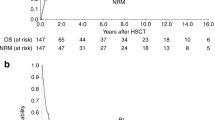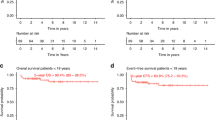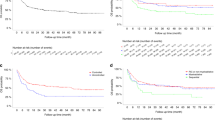Abstract
Allogeneic hematopoietic SCT is an effective treatment in accelerated (AP) or blast phase (BP) CML. Imatinib (IM) has transient but significant activity in advanced phases of CML, which may permit early allografting for responding patients. To identify prognostic factors in allograft recipients previously treated with IM, we analyzed 449 allogeneic hematopoietic SCTs performed from 1999 to 2004 in advanced-phase CML, using the data reported to the Center for International Blood and Marrow Transplant Research. CML patients in second chronic phase (CP2, n=184), AP (n=185) and BP (n=80) received HLA-identical sibling (27%), related (3%), or matched or mismatched unrelated donor (70%), peripheral blood (47%) or BM (53%) hematopoietic SCT after myeloablative (78%) or non-myeloablative (22%) conditioning. In all, 52% in CP2, 49% in AP and 46% in BP received IM before hematopoietic SCT. Disease-free survival was 35–40% for CP2, 26–27% for AP and 8–11% for BP. Cumulative incidence of acute and chronic GVHD and TRM were not affected by the stages of CML or pre-hematopoietic SCT IM exposure. Multivariate analyses showed that conventional prognostic indicators remain the strongest determinants of transplant outcomes. In conclusion, there are no new prognostic indicators of the outcomes of allogeneic hematopoietic SCT for advanced-phase CML in the IM era.
This is a preview of subscription content, access via your institution
Access options
Subscribe to this journal
Receive 12 print issues and online access
$259.00 per year
only $21.58 per issue
Buy this article
- Purchase on Springer Link
- Instant access to full article PDF
Prices may be subject to local taxes which are calculated during checkout

Similar content being viewed by others
References
Talpaz M, Silver RT, Druker BJ, Goldman JM, Gambacorti-Passerini C, Guilhot F et al. Imatinib induces durable hematologic and cytogenetic responses in patients with accelerated phase chronic myeloid leukemia: results of a phase 2 study. Blood 2002; 99: 1928–1937.
Kantarjian HM, O’Brien S, Cortes JE, Smith TL, Rios MB, Shan J et al. Treatment of Philadelphia chromosome-positive, accelerated-phase chronic myelogenous leukemia with imatinib mesylate. Clin Cancer Res 2002; 8: 2167–2176.
Sureda A, Carrasco M, de Miguel M, Martinez JA, Conde E, Sanz MA et al. Imatinib mesylate as treatment for blastic transformation of Philadelphia chromosome positive chronic myelogenous leukemia. Haematologica 2003; 88: 1213–1220.
Sawyers CL, Hochhaus A, Feldman E, Goldman JM, Miller CB, Ottmann OG et al. Imatinib induces hematologic and cytogenetic responses in patients with chronic myelogenous leukemia in myeloid blast crisis: results of a phase II study. Blood 2002; 99: 3530–3539.
Kantarjian HM, Cortes J, O’Brien S, Giles FJ, Albitar M, Rios MB et al. Imatinib mesylate (STI571) therapy for Philadelphia chromosome-positive chronic myelogenous leukemia in blast phase. Blood 2002; 99: 3547–3553.
Oehler VG, Gooley T, Snyder DS, Johnston L, Lin A, Cummings CC et al. The effects of imatinib mesylate treatment before allogeneic transplantation for chronic myeloid leukemia. Blood 2007; 109: 1782–1789.
Perz JB, Khorashad JS, Marin D, Apperley JF, Olavarria E . Imatinib preceding allogeneic stem cell transplantation in chronic myeloid leukemia. Haematologica 2006; 91: 1145–1146.
Deininger M, Schleuning M, Greinix H, Sayer HG, Fischer T, Martinez J et al. The effect of prior exposure to imatinib on transplant-related mortality. Haematologica 2006; 91: 452–459.
Bornhauser M, Kroger N, Schwerdtfeger R, Schafer-Eckart K, Sayer HG, Scheid C et al. Allogeneic haematopoietic cell transplantation for chronic myelogenous leukaemia in the era of imatinib: a retrospective multicentre study. Eur J Haematol 2006; 76: 9–17.
Zaucha JM, Prejzner W, Giebel S, Gooley TA, Szatkowski D, Kalwak K et al. Imatinib therapy prior to myeloablative allogeneic stem cell transplantation. Bone Marrow Transplant 2005; 36: 417–424.
Shimoni A, Kroger N, Zander AR, Rowe JM, Hardan I, Avigdor A et al. Imatinib mesylate (STI571) in preparation for allogeneic hematopoietic stem cell transplantation and donor lymphocyte infusions in patients with Philadelphia-positive acute leukemias. Leukemia 2003; 17: 290–297.
Tiribelli M, Marin L, Calistri E, Geromin A, Damiani D, Fanin R . Imatinib mesylate (Glivec) pre-treatment does not have a negative effect on outcome of allogenic hematopoietic stem cell transplantation in Philadelphia-positive leukemias. Bone Marrow Transplant 2004; 34: 827–828.
Wassmann B, Pfeifer H, Scheuring U, Klein SA, Gokbuget N, Binckebanck A et al. Therapy with imatinib mesylate (Glivec) preceding allogeneic stem cell transplantation (SCT) in relapsed or refractory Philadelphia-positive acute lymphoblastic leukemia (Ph+ALL). Leukemia 2002; 16: 2358–2365.
Saussele S, Lauseker M, Gratwohl A, Beelen DW, Bunjes D, Schwerdtfeger R et al. Allogeneic hematopoietic stem cell transplantation (allo SCT) for chronic myeloid leukemia in the imatinib era: evaluation of its impact within a subgroup of the randomized German CML Study IV. Blood 2010; 115: 1880–1885.
Weisdorf D, Spellman S, Haagenson M, Horowitz M, Lee S, Anasetti C et al. Classification of HLA-matching for retrospective analysis of unrelated donor transplantation: revised definitions to predict survival. Biol Blood Marrow Transplant 2008; 14: 748–758.
Druker BJ, Guilhot F, O’Brien SG, Gathmann I, Kantarjian H, Gattermann N et al. Five-year follow-up of patients receiving imatinib for chronic myeloid leukemia. N Engl J Med 2006; 355: 2408–2417.
Lee SJ, Kukreja M, Wang T, Giralt SA, Szer J, Arora M et al. Impact of prior imatinib mesylate on the outcome of hematopoietic cell transplantation for chronic myeloid leukemia. Blood 2008; 112: 3500–3507.
Gratwohl A, Hermans J, Goldman JM, Arcese W, Carreras E, Devergie A et al. Risk assessment for patients with chronic myeloid leukaemia before allogeneic blood or marrow transplantation. Chronic Leukemia Working Party of the European Group for Blood and Marrow Transplantation. Lancet 1998; 352: 1087–1092.
Passweg JR, Walker I, Sobocinski KA, Klein JP, Horowitz MM, Giralt SA . Validation and extension of the EBMT Risk Score for patients with chronic myeloid leukaemia (CML) receiving allogeneic haematopoietic stem cell transplants. Br J Haematol 2004; 125: 613–620.
Crawley C, Szydlo R, Lalancette M, Bacigalupo A, Lange A, Brune M et al. Outcomes of reduced-intensity transplantation for chronic myeloid leukemia: an analysis of prognostic factors from the Chronic Leukemia Working Party of the EBMT. Blood 2005; 106: 2969–2976.
Kantarjian H, Giles F, Wunderle L, Bhalla K, O’Brien S, Wassmann B et al. Nilotinib in imatinib-resistant CML and Philadelphia chromosome-positive ALL. N Engl J Med 2006; 354: 2542–2551.
Talpaz M, Shah NP, Kantarjian H, Donato N, Nicoll J, Paquette R et al. Dasatinib in imatinib-resistant Philadelphia chromosome-positive leukemias. N Engl J Med 2006; 354: 2531–2541.
Baccarani M, Cortes J, Pane F, Niederwieser D, Saglio G, Apperley J et al. Chronic myeloid leukemia: an update of concepts and management recommendations of European Leukemia Net. J Clin Oncol 2009; 27: 6041–6051.
Acknowledgements
The CIBMTR is supported by the Public Health Service Grant/cooperative agreement U24-CA76518 from the National Cancer Institute (NCI), the National Heart, Lung and Blood Institute (NHLBI) and the National Institute of Allergy and Infectious Diseases (NIAID); a grant/cooperative agreement 5U01HL069294 from NHLBI and NCI; a contract HHSH234200637015C with Health Resources and Services Administration (HRSA/DHHS); two grants, N00014-06-1-0704 and N00014-08-1-0058, from the Office of Naval Research; and grants from AABB; Allos, Inc.; Amgen, Inc.; Anonymous donation to the Medical College of Wisconsin; Astellas Pharma US, Inc.; Be the Match Foundation; Biogen IDEC; BioMarin Pharmaceutical, Inc.; Biovitrum AB; BloodCenter of Wisconsin; Blue Cross and Blue Shield Association; Bone Marrow Foundation; Buchanan Family Foundation; CaridianBCT; Celgene Corporation; CellGenix, GmbH; Children's Leukemia Research Association; ClinImmune Labs; CTI Clinical Trial and Consulting Services; Eisai, Inc.; Genentech, Inc.; Genzyme Corporation; Histogenetics, Inc.; HKS Medical Information Systems; Hospira, Inc.; Kirin Brewery Co., Ltd.; The Leukemia & Lymphoma Society; Merck & Company; The Medical College of Wisconsin; Millennium Pharmaceuticals, Inc.; Miller Pharmacal Group; Milliman USA, Inc.; Miltenyi Biotec, Inc.; National Marrow Donor Program; Nature Publishing Group; Novartis Oncology; Oncology Nursing Society; Osiris Therapeutics, Inc.; Otsuka America Pharmaceutical, Inc.; Pall Life Sciences; Pfizer Inc; Schering Corporation; Sigma-Tau Pharmaceuticals; Soligenix, Inc.; StemCyte, Inc.; StemSoft Software, Inc.; Sysmex America, Inc.; THERAKOS, Inc.; Vidacare Corporation; ViraCor Laboratories; ViroPharma, Inc. and Wellpoint, Inc. The views expressed in this article do not reflect the official policy or position of the National Institute of Health, the Department of the Navy, the Department of Defense or any other agency of the US Government. We are grateful to Drs Manuel M Abecasis, Joseph Antin, Brian J Bolwell, Matthew Carabasi, Francisco Cervantes, Richard A Champlin, Edward Copelan, Gregory A Hale, Jane Liesveld, Mark R Litzow; Eduardo Olivaria and Harry C Schouten for their thoughtful comments and suggestions.
Author information
Authors and Affiliations
Corresponding author
Ethics declarations
Competing interests
Drs J Cortes and DA Rizzieri have received research funding from the Novartis. Dr Rizzieri also received an honorarium from Novartis. Dr Jeffrey Szer received a consultant or advisory role compensation from Novartis.
Additional information
This work was presented as a poster at the Annual Meeting of the CIBMTR in February 2009.
Supplementary information
Rights and permissions
About this article
Cite this article
Khoury, H., Kukreja, M., Goldman, J. et al. Prognostic factors for outcomes in allogeneic transplantation for CML in the imatinib era: a CIBMTR analysis. Bone Marrow Transplant 47, 810–816 (2012). https://doi.org/10.1038/bmt.2011.194
Received:
Revised:
Accepted:
Published:
Issue Date:
DOI: https://doi.org/10.1038/bmt.2011.194
Keywords
This article is cited by
-
Real-world Management of CML: Outcomes and Treatment Patterns
Current Hematologic Malignancy Reports (2023)
-
Outcomes and toxicity of allogeneic hematopoietic cell transplantation in chronic myeloid leukemia patients previously treated with second-generation tyrosine kinase inhibitors: a prospective non-interventional study from the Chronic Malignancy Working Party of the EBMT
Bone Marrow Transplantation (2022)
-
Allogeneic stem cell transplantation for chronic myeloid leukemia in the TKI era: population-based data from the Swedish CML registry
Bone Marrow Transplantation (2019)
-
Donor type, in addition to transplantation in chronic phase and myeloablative conditioning, influence transplant survival for patients with advanced chronic myeloid leukemia in the era of tyrosine kinase inhibitors
Leukemia (2017)
-
Allogeneic transplantation for CML in the TKI era: striking the right balance
Nature Reviews Clinical Oncology (2016)



